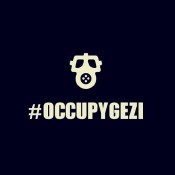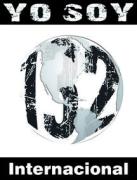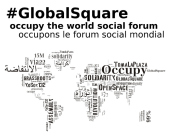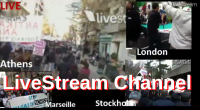Hello from Barcelona,
this is the weekly newsletter that will inform you about the activities of 15M movement in Barcelona, Catalonia and occasionally the main events in Spain. If you do not wish to receive it anymore, please say so.
1. #25N elections in Catalonia
2. Hunger strike for work and dignity
3. Information Brigades
1. #25N ELECTIONS IN CATALONIA
On November 25th there were local elections in Catalonia, conditioned by a new factor: the rise of Catalan pro-independence movement.
Convergència i Unió, the political party currently in the government, called for anticipated elections after two years of governance.
On September 20th the Catalan president, Artur Mas, had a meeting with Rajoy, head of the Spanish Government, to get a fiscal agreement which Catalonia has been seeking for a long time. As they didn’t reach an agreement, on September 25th – while the Spanish congress was surrounded by thousands of protesters (see NL#28 ,1 ), Mas announced that he was closing down the Catalan Parliament and calling anticipated elections. But these elections came after a demonstration with 1.5 million people in the streets on September 11th claiming for independence (See NL#26, 1 )
So CiU decided to launch a new campaign promising a referendum on independence if they achieved an ample, absolute majority, with a huge campaign moving the pro-independence feelings and reaching sometimes a messianic tone when picturing President Mas as the leader of the Catalan People towards liberty.
CiU is a pro-austerity measures party that follows the orders of the Troika and saves banks with public money while it makes incredible budget cuts in public services. They say they have no other option because the Spanish central government is forcing them to do it, but this is only a smokescreen. They’re using the pro-independence feeling, their arguments with the central government and these elections to hide their budget cuts and privatizations.
This is not the only reason, CiU is a corrupt party, involved in the biggest robbery of public money from the healthcare system in Catalonia (see Nl#18 , 4 ). Xavier Crespo, the alleged corrupt, is going to declare in court this same month yet he is number 4 in the lists for CiU in Girona. Knowing this, CiU put the elections date before the court hearings, so they don’t lose votes because of the scandal. It was also handy to call off the Parliament in time to avoid three official investigations taking place on CiU’s involvement in several scandals and cases of political corruption.
Their strategy was clear: to reach absolute majority (more than the 50% of the parliament) by promising independence for Catalonia. With this power they could do all sorts of austerity measures without needing the other parties’ approval. But after the elections CiU lost 12 deputees and other classical parties fell down, such as the Catalan socialist party PSC or the Catalan fascists PxC, while some alternative parties, specially pro-independence ones, raised their votes.
But why didn’t it work?
Some people weren’t fooled about this, CiU said they’ll put Catalonia as new state in the European Union, but this is actually almost impossible if we take into account some of the EU representatives and deputies’ statements warning Catalonia would not be considered a European country, moreover the independence referendum promised by President Mas would be non-binding.
On the other side, the Catalan independentism is traditionally associated to left wing parties, while CiU is right wing. For this reason their campaign turned against them raising the votes of, on one hand small non-nacionalist parties of the right wing, and on the other one to left wing nationalists.
This situation was surprisingly favorable to a radical left wing party called CUP (Candidatura d’Unitat Popular – Popular Unity Candidature) which has actually working directly with the grassroots through popular assemblies and residents associations since 1968. They managed to get into the parliament with 3 deputees in their first try on the elections, as until now they had been devoted strictly to local politics -working only in villages ans towns, and some smaller cities.
Mainly because they didn’t only called for independence, as they are struggling for social justice and rights and this was their first declared priority.
Another factor in the elections to make CiU lose support was the intervention of the social movements showing their corruption cases, their repression against the people, their good relationship with the central government (they pretend to be enemies as a mediatic strategy) and the lies they’re telling people. This was the strategy by citizen campaigns such as “#CiUEnsRoba” (CiU is robbing us),“#CiUesViolencia” (CiU is violence) and “#CiUEsTroika” (CiU is the Troika) among others.
For these campaigns, many social and political groups, collectives and activists joined forces to fight the common problem: people who had never voted CIU had decided to vote them to support Catalan independence, “and later we’ll solve political differences”. This was the main aim of CiU’s campaign, to get even left-wing voters’ support, and this is what they failed to achieve once people remembered the near future.
Now, the party hasn’t enough deputees to form a government on its own and still will need other parties to join forces. But they achieved to get the left wing against them and the right wing too for using the independence feeling as the edge of their campaign.
Even if they planned to ignore their promise and not to create a new state, it seems that now there’s a parliamentary majority in favor of the right of self-determination, and this sets a whole new scenario.
LINKS
- BLOG ENTRIES
- CiU’s corruption cases [EN]
Articles
- Catalan premier Mas falls short of absolute majority for sovereignty plan [EN]
- Voters deal blow to Catalan president’s hopes for independence referendum [EN]
- Ruling CiU seen winning Catalonia vote, but losing seats [EN]
- Divisive Election in Spain’s Catalonia Gives Win to Separatist Parties [EN]
- Catalonia election: Separatists win majority [EN]
- Demonstration against CIU’s smoke curtain [SP]
- Corruption converges in CiU [SP]
- EU insists: Separatists are left outside of the EU and excluded [SP]
Videos
- Rubber bullets and repression, video call for november 22nd’s demonstration [CAT]
- Catalonia, Finland or Equatiorial Guinea [SP]
Twitter: #CiUensRoba #CiUesViolencia #CiUesTroika #BonCopDesfalc @CIUensroba @CIUestroika @novotisCIU
2. HUNGER STRIKE FOR WORK AND DIGNITY
A hunger strike which lasted 23 days started on November 5th in the building of the biggest telecommunications company in Spain: Telefonica. After having a profit of 10,167 million euro in 2010, they announced the mass dimissal of 6,500 workers in april 2011. This was possible thanks to the labour law that changed in 2011, allowing companies to do these mass dimissals in case of perceiving a risk of reducing their profit. Most of the workers volunteered to take part of the layoff plan: Some of them got an early retirement, some others had huge compensations. There were only a few critical voices inside the company, while outside a lot of people were claiming against Telefonica’s lack of social responsability for laying off that many workers in the middle of a crisis.
While this was happening, Marcos and Mari Cruz were laid off as well, but under totally different circumstances that the new law also permited: absentism and lack of productivity, which in their cases wasjustified with a sick leave. Both think that, in fact, it was a strategy of the company to silence the rest of the workers about the mass dimissal through the fear of losing their jobs. Some people got together to perform the first Telefonica flashmob to protest against the situation of Marcos on May 2011 and there have been since several flashmobs, strikes and protests to give him support for almost two years.
Marcos was involved in trade union activity and stood for the elections for the works committee, and besides the new absentism law was applied retroactively, so sacking him was against the constitution on grounds of breach of fundamental rights in both cases. That was why Marcos sued the company and the court declared his dimissal null and void. This meant the company had to readmit him. But Telefonica appealed the court’s decision and then the dimissal was declared unfair, which left the decision of readmiting Marcos to be taken by the company. Marcos doesn’t want the compensation they offered him, he wants his job back. Besides this, the situation in the company has become dramatic: sick workers go to work afraid of losing their jobs if they stay at home, and a big silence policy has been generated.
As the situation around Marcos case arrived to a dead point, the platform “Yes, I am profitable” (Plataforma Sí soy Rentable), Marcos readmission Platform (Plataforma Marcos Readmisión) and two unions of the company made a call for a hunger strike on November 5th, in the company’s building, at the works committee offices. The strike was followed by Marcos and six more people which are members of the committee and job mates. Many others showed solidarity as well, as more than one hundred collectives went over to support them along the 23 days the strike lasted, although some of the strikers had to abandon halfway through due to health concerns and only 4 resisted the 23 days. The demands were the readmision of Marcos and the guarantee that nobody else in the company could be laid off because of being sick. Many other actions were done around the strike: demonstrations, concerts, flashmobs, twitter campaigns, etc.
After 23 days, on November 27th they called for a press release and they stopped the strike, although they hadn’t reached the readmission. They considered that some objectives were accomplished, such as breaking the media silence, gathering together social movements and work struggles, showing new ways of fighting which are strong enough to face big corporations and a promise of several parties, unions and social organisations to act as mediators in the conflict and to work towards a law which protects sick workers from being laid off.
They announced they will step forward if mediation doesn’t work.
LINKS
Articles
- Hunger strike blog [EN]
- Press release Nov 27th [SP]
- We’re fighting against Telefonica in its own grounds [SP]
Videos
- 20 days by bcn tv [SP]
- 17 days by bcn tv [SP]
- Letter from Marcos to the company [SP]
- Streaming channel
Pictures
- Photogalleries by @fotomovimiento:
- Portraits by @unFotografo
- Photogallery by R. Fornell
Twitter: @HHTelefonica; #MovistarNosRoba ; #HuelgaHambreTelefonica
3. INFORMATION BRIGADES
Flyers, manifestos, posters and many other materials are always distributed and spread around before an action or moblization to call the people to join.
How can the collectives, assemblies and working groups make, share and get easily these materials to hand out and paste on the streets?
Before, a group used to be in charge of printing it all and distribute the posters etc to some points, where neighbourhoods and collectives could go to get them. The problem was that very often this situation was not satisfactory, as it was not possible to modify the graphic works in order to adapt them, customizing the poster or flyer according to the collective or group that was going to use it -the local meeting point to go together to a big unitary demo, for instance.
To improve this situation the neighbourhood assemblies created the Information Brigades, a working group to manage an on-line tool where all this material can be found, in a modifiable format so every person or collective can change it at its will. Although anyone can access this shared space, only authorised groups can upload material, which usually has collective authors and sometimes is offered by external designers, from collectives who are spreading a campaign and would appreciate the Information Brigades‘ support. The IB have to communicate every time new material is available, but the decision of printing and difussion relies on the neighbourhood assemblies and collectives.
Besides the on-line tool, they have been performing different ways to reach people offline: they have created a map so that people know the activity of the neighbourhoods in days of hign mobilization, they’re trying to take advantage of traffic signals and banners to stick some messages on them and are working on further ideas based on collective creativity.
All in all, these brigades are a well accepted initiative to make it easier to self-manage every assembly’s sign making needs and keep the people informed, on and offline.
LINKS
Twitter: @BrigaInfoBcn















Leave a comment